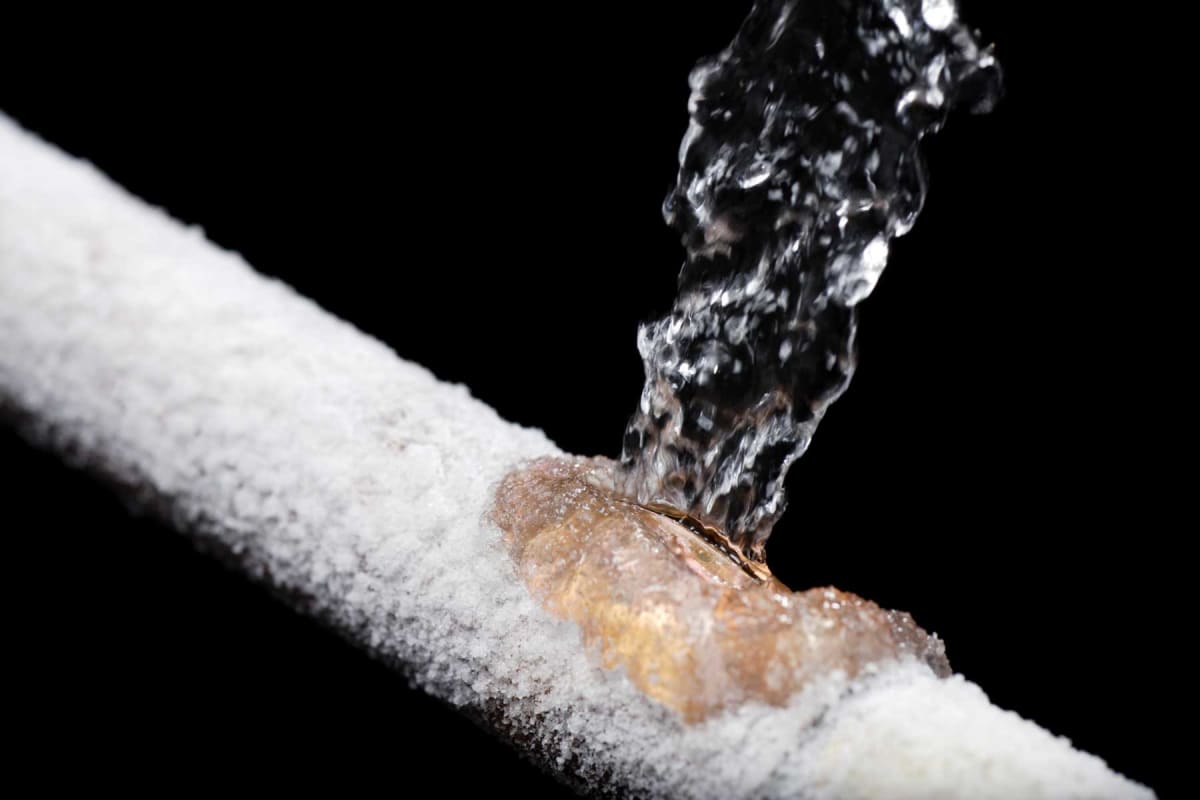
At what temperature do pipes freeze?
At what temperature do pipes freeze?
Pipes in a house are most at risk of freezing when temperatures are 20° F or lower outside. Whether the pipes actually freeze or burst depends on how insulated they are, how long temperatures stay low, and the indoor temperature. Water pipes in an uninsulated crawl space or attic are more likely to freeze.
| Quick facts |
|---|
|
Factors that determine whether your pipes will freeze
Besides temperature, there are a few other indicators that your pipes are at risk of freezing:
Region: Homes in northern states often have designs and insulation that prevent freezing. Homes in warmer locations are less likely to be prepared for cold snaps.
Cold snap length: If the temperature only drops for a little while, your pipes are unlikely to freeze. However, when temperatures drop for 4 to 6+ hours, pipes will likely freeze unless you take preventive measures.
Pipe location: Pipes towards the center of a home are more protected and less likely to freeze than plumbing in an attic, crawl space, or along an exterior wall.
Insulation: Pipes with heat tape or insulation are 3 to 4 degrees warmer on average than plumbing with none.
Pipe material: Copper pipes are excellent heat conductors but freeze more quickly than other materials. PEX piping is more resistant to freezing and is best for northern climates.
How to keep pipes from freezing
The minimum thermostat setting to keep pipes from freezing is 55° F. By keeping your home and plumbing at a stable temperature, you can prevent frozen pipes. When outdoor temperatures fall to 20° F or lower, follow these tips in addition to adjusting your thermostat:
Leave a sink faucet dripping
Keep all exterior doors closed
Seal any leaks
Drain any outdoor faucets
Open cabinet doors under sinks
Add insulation to pipes
Use heat tape on plumbing
Run a space heater in cold spaces
How to thaw frozen pipes
If a section of plumbing is already frozen, act quickly to avoid a burst pipe. If your pipes break or burst, go to your main water shutoff valve and turn it off right away. However, if the pipes are frozen but not cracked or broken, follow these steps:
Turn on a nearby faucet on a low setting to help melt the ice.
Use a heating pad, space heater, hair dryer, or hot towel to slowly heat the pipe. Don't use a blowtorch, intense heat, or an open flame.
Apply heat until your water pressure returns to normal.
Check for any leaks or cracks in the pipes and at joints.
Examine other faucets and fixtures to make sure nothing else froze.
Repairing a burst pipe costs $150 to $250 per linear foot or $400 to $2,000 total, which is much more expensive than the cost to prevent it.
FAQs about winterizing pipes
How would I know if my pipes were frozen?
The most common sign that your pipes are frozen is no water or only a trickle when you turn on the tap. Some other signs are:
Frost or ice on the pipes
Clanking or banging when you turn on the faucet
Odors coming from a fixture
Leaks or water spots
Visible cracks or dripping
Can pipes freeze overnight?
Yes, your pipes can freeze overnight, especially when outdoor temperatures drop rapidly and stay low for several hours. Take proper precautions during sudden cold fronts, especially if winter weather has caused a power outage.
What kind of damage does a burst pipe cause?
A burst pipe can flood a home, destroying many belongings. It can ruin flooring and carpets, which you'd need to replace. If you don't act quickly, burst pipes can also cause mold and mildew growth, which can lead to serious health problems.

Getting estimates from plumbers
For pipe freezing and other plumbing projects, contact a plumbing repair service near you and follow these suggestions:
Read customer reviews on HomeGuide or Google.
Pick a licensed, bonded, insured plumber.
Ask for a written estimate with material and labor costs.
Ask if they have any discounts or coupons.
Don't pay the bill in full until they finish the repair.
Ask if they'll give you a warranty for their labor.
Questions to ask a plumbing repair technician
Ask the following questions when trying to find someone to repair a burst pipe:
How many repair jobs like this have you done?
How do you decide where the leak comes from?
Is the leak coming from the water main or just inside my home?
Will my existing plumbing need any adjustments?
Do you install plumbing insulation? How much would you charge for that?
Will you give me a written, itemized quote?
Does this estimate include both labor and material charges?
Will you have to get a permit for this job? Is that included in the quote?
How long do you estimate the repair will take?
Do you have any experience billing through a customer's home insurance?
How soon can you come to repair this?